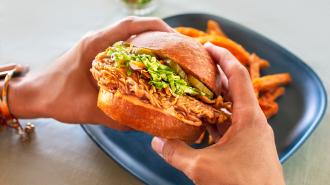Cultured meat is a big step closer to sale in the US, thanks to a new FDA announcement regarding startup UPSIDE Foods’ lab-grown chicken.
Lab-grown meat: To produce meat in the lab, scientists extract muscle cells from living animals and combine them with substances that help the cells grow and multiply. Eventually, they end up with cultured meat that’s molecularly identical to the kind that comes from animals.
This means it has the same flavor as “real” meat, which could make it more appealing to people who want to cut back on their meat consumption — for ethical reasons, perhaps, or due to its negative impact on the environment — but don’t love the taste of plant-based alternatives.
Cultured meat is produced by coaxing muscle cells to grow and multiply outside an animal’s body.
The red tape: In 2019, the FDA and USDA announced that they’d be co-regulating cultured meat: the FDA would oversee the collection and cultivation of the animal cells, and the USDA would oversee the cell harvesting, as well as product processing, labeling, and packaging.
The only exception would be cultured seafood — the FDA would oversee production of that from beginning to end.
Early talks: In October 2021, cultured meat startup UPSIDE Foods began voluntarily submitting documentation to the FDA to demonstrate that its lab-grown chicken is as safe to eat as comparable foods.
“These communications informed FDA of the steps taken by UPSIDE to ensure that this food complies with the legal and regulatory requirements that fall within FDA’s jurisdiction,” wrote Kristi Muldoon-Jacobs, acting director of the FDA’s Office of Food Additive Safety.
On November 16, 2022, the FDA announced that it had “no further questions at this time” regarding UPSIDE’s conclusions about the safety of its lab-grown chicken.
“FDA sets the standard for global acceptance of new food innovations, and we are incredibly grateful for the agency’s rigorous and thoughtful process to ensure the safety of our food supply,” said Eric Schulze, VP of Regulatory and Public Policy at UPSIDE Foods.
The cold water: This does not amount to US government approval to sell UPSIDE’s cultured meat — it just means that, based on what UPSIDE has shown the FDA, the agency accepts the startup’s claim that its lab-grown chicken is safe for people to eat.
Before UPSIDE can sell its cultured chicken, it needs to prove its facilities meet FDA and USDA requirements and get the food officially approved by the USDA. It will also need to go through the entire process again for any other types of cultured meat it hopes to sell in the future.
Even after all of that, if UPSIDE isn’t able to meet its goal of producing its lab-grown chicken at a price comparable to poultry, it could simply become a culinary novelty, available only at high-end restaurants — or never get sold at all.
Before UPSIDE can sell its lab-grown chicken, it needs to get it officially approved by the USDA.
The bottom line: This is the closest any cultured meat maker has come to approval in the US, and the FDA says it’s already talking to other companies — meaning it might not be long before cultured meat moves out of labs and into American restaurants and grocery stores.
“This is a critical milestone toward the future of food,” Bruce Friedrich, president of the Good Food Institute, a nonprofit think tank focused on improving global food systems, told the Washington Post.
“Cultivated meat will soon be available to consumers in the US who desire their favorite foods made more sustainably, with production requiring a fraction of the land and water of conventional meat when produced at scale,” he continued.
We’d love to hear from you! If you have a comment about this article or if you have a tip for a future Freethink story, please email us at [email protected].






